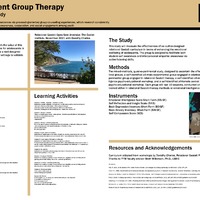Relational Gestalt Group Therapy for Adolescents
Item
Poster Number
25
Poster Title
Relational Gestalt Group Therapy for Adolescents
First Presenter
Leah Fear
Abstract
The perceived value of providing public school students with socio-emotional learning opportunities has grown tremendously in recent years. Rooted in the progressive educational philosophy of such seminal thinkers as John Dewey, Rudolf Dreikurs, and Maria Montessori, socio-emotional learning outcomes have become central to the emotional intelligence movement led by modern scholars such as Daniel Goleman and Daniel Siegel. A method for enhancing socio-emotional learning outcomes is via processing-oriented group counseling experiences, which research consistently demonstrates can enhance self-acceptance, other-awareness, cooperation, and social engagement among youth. Relational Gestalt group therapy for adolescents offers an opportunity to educate young people and provide them with therapeutic socio-emotional learning experiences. This study will measure the effectiveness of an author-designed relational Gestalt curriculum in terms of enhancing the emotional wellbeing of adolescents. The group is designed to facilitate both student self awareness and interpersonal empathic awareness via active listening skills. Relational Gestalt therapy is used because experiential work is particularly beneficial for adolescents. It emphasizes the skillful expression of emotions, which adolescents are still learning. The project utilizes processing-oriented group work rather than individual counseling due to the support group members provide one another. Group work also provides a more efficient use of time in school settings. Groups will be composed of adolescents struggling with behavior or emotional issues as identified by parents, guardians, teachers, and administrators. The daily curriculum will include check-in, general instruction, small group practices (experiments), and sharing with the whole group. Therapeutic methods include lessons on Gestalt values, Gestalt experiments, and use of Gestalt language and group work norms as demonstrated by Dorothy Charles, a Relational Gestalt practitioner. The mixed methods, quasi-experimental study, designed to ascertain the effectiveness of the curriculum, will utilize four distinct groups: a self-identified all-male experimental group engaged in relational Gestalt therapy, a self-identified all-female experimental group engaged in relational Gestalt therapy, a self-identified all-male control group engaged in an emotional intelligence psycho-educational workshop, and a self-identified all-female control group engaged in an emotional intelligence psycho-educational workshop. Each group will last 10 sessions, conducted once per week, and will be led by facilitators trained either in relational Gestalt therapy methods or emotional intelligence psycho-educational methods. Pre- and post-tests will include the Emotional Intelligence Scale-Short Form (EIS-SF), the Self-Reflection and Insight Scale (SRIS), the Beck Depression Inventory-Short Form (BDISF), the Beck Anxiety Inventory- Short Form (BAI-SF), and the Self-Compassion Scale (SCS). Selected participants will engage in qualitative interviews using semi-structured interview processes following completion of the groups. The purpose of this submission is to demonstrate both the value of this project in terms of socio-emotional learning outcomes for adolescents in public school settings, as well as to demonstrate how a well-designed mixed-methods study can be implemented in school settings to validate new and innovative group procedures. The project will culminate in the implementation of the project, to be completed in 2024.
Year
2022
Embargo
no embargo
